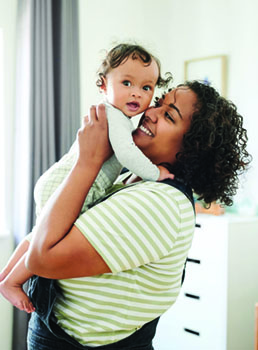Attention New Moms… Get Your Body Back!
The ‘Fourth Trimester’
 If you’ve recently given birth — or if you’re newly pregnant — you’re likely familiar with the first three trimesters of pregnancy. But what is the “fourth trimester,” and how does it impact your wellbeing during the postnatal period and many years into the future?
If you’ve recently given birth — or if you’re newly pregnant — you’re likely familiar with the first three trimesters of pregnancy. But what is the “fourth trimester,” and how does it impact your wellbeing during the postnatal period and many years into the future?
“The fourth trimester is the 12-week period immediately after your baby is born,” explains Janet Drake Whalen, an Abdominal and Pelvic Health Physical Therapist with Grand View Health.
During the fourth trimester, a mom’s body begins adjusting to not being pregnant anymore. This could lead to new and unexpected medical issues — including pain and discomfort. The good news is that women can find expert help at Grand View Health from abdominal and pelvic floor physical therapists as they seek to regain their sense of normalcy.
What happens to the pelvic floor during pregnancy
A woman’s body goes through many changes during pregnancy, and many of those changes affect their abdomen and pelvic floor.
During the second trimester, for example, the baby grows, expanding a woman’s uterus. This creates stress on the abdominal wall, pelvic floor muscles and surrounding tissues. This added stress can lead to lower back, hip or mid-back pain. Added weight and fluid retention during the third trimester can further strain the pelvic floor muscles.
Another concern is the stretching of the rectus abdominal (“six pack”) muscle, a condition known as diastasis recti. Research shows that it affects up to 60% of women either during or after pregnancy. “When the abdominal wall stretches, it may lead to dysfunctions of the pelvic floor and breathing mechanics, along with possible pain in the lower back,” Drake Whalen says.
When to seek help
The Pelvic Floor Physical Therapy program at Grand View Health helps women become more comfortable during pregnancy and regain their quality of life postpartum.
You may benefit from physical therapy if you experience pain or discomfort in the pelvic region, lower abdomen, perineum, rectum, vagina, lower back, hip, groin or have pain with or after intercourse.
“Women may also experience leakage of urine when coughing, sneezing, on the way to the bathroom or getting up from a chair,” Drake Whalen says.
Abdominal and pelvic health physical therapists are specially trained to help relieve pain and discomfort in pregnant and postpartum women. They will instruct you in an individualized exercise program, provide manual therapy techniques to areas of concern, and educate you on baby body mechanics and your physical recovery to help you transition back to your pre-pregnant self.
Contact your OB/GYN for a prescription.
To see a pelvic floor therapist, call:
- 215-513-3950: Harleysville
- 215-453-3220: Sellersville
